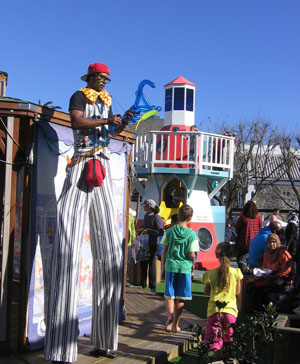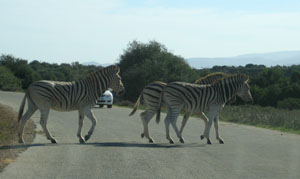Carole Langille, a poetry instructor in Dal’s Creative Writing program, was hoping for the trip of a lifetime when she went to South Africa to participate in the Grahamstown Festival, an annual celebration of art and culture. Her three-week stay “was more even intense than I imagined it would be.”
The Grahamstown Festival, the largest of its kind on the African continent, has provided a venue for artists, musicians, poets and other creative types to share their work since 1973. This year, Prof. Langille was invited to the festival to do a poetry workshop with students in the Creative Writing program at Rhodes University in Grahamstown. She also did two readings: one at the festival and another in Cape Town.
Prof. Langille has led workshops and given poetry readings in other far-flung locations, including India and Prague. But she says of all places, “South Africa has had the most powerful effect on me.”
Connecting through Ubuntu
Part of why the trip was so powerful can be summed up in one word: Ubuntu. Sometimes described as a philosophy or a way of life, the term, from the Nguni Bantu language, can be translated roughly as “human kindness.”
 “I talked about Ubuntu with a young man we met who was at the festival to watch breakdancing. He said that you can translate [Ubuntu] as ‘I am what I am because you are what you are,’” Prof. Langille explains. “The idea is that there’s a certain graciousness in humanity that binds us all together.”
“I talked about Ubuntu with a young man we met who was at the festival to watch breakdancing. He said that you can translate [Ubuntu] as ‘I am what I am because you are what you are,’” Prof. Langille explains. “The idea is that there’s a certain graciousness in humanity that binds us all together.”
Ubuntu has long been integral to South African culture, as Nelson Mandela explains in a short video: “In the old days … a traveller would stop, and he didn't have to ask for food or water. The people just gave him food and water. That’s one aspect of Ubuntu.”
As a traveller herself, Prof. Langille saw this side of Ubuntu firsthand when asking for directions in the three cities she visited. “People would answer, ‘That's a couple of blocks away. Here, I'll show you,’ and walk with us! When we thanked them, they would always say, ‘My pleasure,’ and mean it,” she says. “The people we met were deeply generous.”
That also goes for the poets she met in South Africa, one of whom hosted Prof. Langille and her husband for a couple of days in Cape Town. And it was through another poet that the trip came to be in the first place. A participant in the poetry workshop she’s been giving for several years in Mahone Bay, N.S. was originally from South Africa and suggested she get in touch with Robert Berold, a poet and head of the Creative Writing program at Rhodes University. She and Berold “really clicked,” she says. “We see poetry in a similar way.”
Reading and writing and poetry workshopping
At her reading at Rhodes University, Prof. Langille shared work from her recent book, Church of the Exquisite Panic: The Ophelia Poems, which was nominated for the 2013 Atlantic Poetry Prize. “Robert Berold encouraged me to talk a bit about Ophelia. I think Ophelia represents those whose voices were taken away. When I mentioned this students were nodding, saying, ‘Yes, yes!’”
 In the workshop at Rhodes University, Prof. Langille handed out copies of poems about childhood experiences by Mary Karr, Carolyn Forché, Philip Levine and Julie Bruck. “Then I asked the students to write about their own childhood memories. Some wonderful poems came from that,” she says. “They were able to go really deep. It was so moving to be there.”
In the workshop at Rhodes University, Prof. Langille handed out copies of poems about childhood experiences by Mary Karr, Carolyn Forché, Philip Levine and Julie Bruck. “Then I asked the students to write about their own childhood memories. Some wonderful poems came from that,” she says. “They were able to go really deep. It was so moving to be there.”
Leading such workshops and doing other forms of poetry “outreach” allows Prof. Langille to see “how powerful poetry is, and that it doesn’t have to do with publication or prizes. People want to share what’s essential and important to them,” she says. “Working hard on a poem is a way of honouring experience.”
Prof. Langille has found this of the students in the poetry workshops she teaches here at Dal. “Most students in my class do work hard. They have to write a poem a week. When I meet with students and ask, ‘Do you find this too much work?’ They always say, ‘No.’ By the end of the semester they realize that only when the writer discovers something by writing the poem, will the reader discover something.”
“[Through poetry,] students have an opportunity to explore experience in a unique way. Taking a writing course in poetry or fiction broadens you, whatever your major. I love working with students in the poetry class. So many are brave, creative, smart.”
Bringing it back home
“When I travel, especially when the travel is connected with poetry, I am always happy and grateful,” Prof. Langille says. “When I return, everything is more spacious. And I feel that I can speak with more authority – I have proof that poems open up the world.”
“And the poems I’ve been exposed to in South Africa, I’ll use in my workshops here at Dal,” she says.
Prof. Langille says she also plans to incorporate Ubuntu into her teaching practice. “Poetry is about what connects us. In your writing, you have to be as specific as possible, that’s the only way we can connect,” she explains. “The personal is the universal.”

